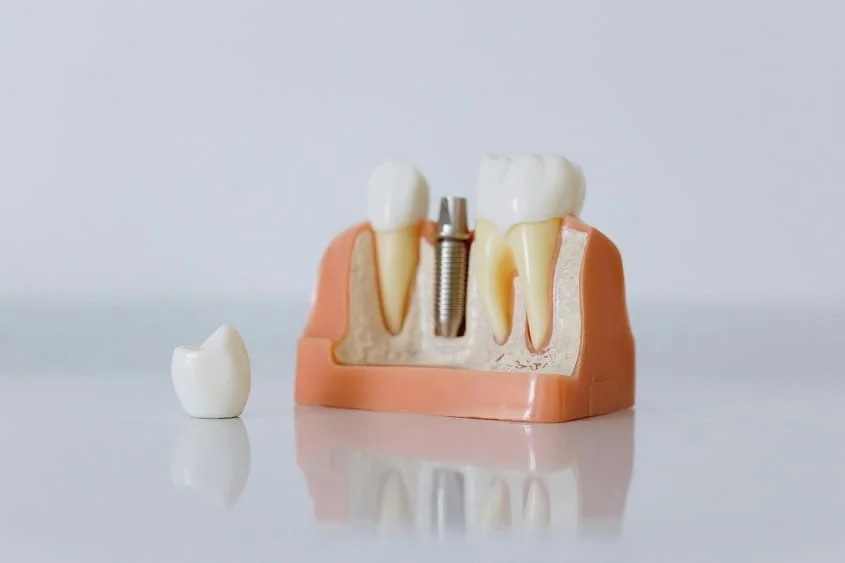The Link Between Tooth Loss and Overall Health
- Updated on: Nov 29, 2024
- 3 min Read
- Published on Nov 28, 2023

So, here we look at the impact of tooth loss on both physical and mental health, seeking to throw light on the hidden health consequences of tooth loss and the psychological toll of living with missing teeth.
Hidden Health Consequences of Tooth Loss
While tooth loss may seem like a minor issue, it can have significant consequences for your overall health. When we lose a tooth, it does not only affect our ability to chew and speak properly, but also has a domino effect on the rest of our oral health. The empty space left by a missing tooth can cause neighboring teeth to shift, leading to misalignment and problems that affect the ability to bite and chew. This can result in jaw pain, headaches, and even temporomandibular joint disorder (TMJ).
Furthermore, tooth loss can impact our ability to properly digest food. Chewing is the first step in the digestion process and when you have missing teeth, you may not be able to break down food effectively. This can lead to digestive issues such as acid reflux and malnutrition. That’s why more needs to done in highlighting the benefits of dental implants for example, as they are a reliable and permanent tooth replacement option that can significantly improve your quality of life.
The Link Between Dental Health and Overall Well-being
Your oral health is closely connected to your overall well-being. Research has shown that poor dental health is associated with an increased risk of various systemic diseases, including cardiovascular disease, diabetes and respiratory infections. The mouth serves as a gateway to the rest of your body, and any infection or inflammation in the oral cavity can spread to other organs and systems.
For instance, gum disease which is often a result of poor oral hygiene has been linked to an increased risk of heart disease. The bacteria present in gum disease can enter the bloodstream and contribute to the formation of plaque in the arteries, leading to atherosclerosis and potentially heart attacks or strokes.
Individuals with diabetes are more prone to gum disease, and gum disease can make it more difficult to control blood sugar levels. This bidirectional relationship between oral health and systemic health highlights the importance of maintaining good dental hygiene and seeking timely dental care. By prioritizing oral hygiene, seeking regular dental care and addressing any dental issues promptly, you can help maintain good oral health as well as your overall health and well-being.
The Impact of Tooth Loss on Mental Health
Losing your teeth doesn’t just affect your physical well-being, it can also have a profound impact on your mental health. The absence of teeth can bring about feelings of embarrassment, as you are overly self-conscious and your self-esteem gets impacted negatively. This can shake your confidence in your appearance and hinder your ability to socialize and connect with others. When you have gaps in your smile, you may find yourself feeling self-conscious about your looks, leading to social anxiety and a decline in your overall sense of well-being.
Furthermore, tooth loss can create difficulties in speaking and eating, which can add to feelings of frustration and isolation. It’s not just about the aesthetics, but also the practical challenges that come with missing your teeth.
Research has shown that individuals with missing teeth are more prone to experiencing depression and having lower self-esteem compared to those with a complete set of teeth. The psychological toll of living with tooth loss can impact your relationships, career opportunities and overall quality of life. It’s important to address these concerns and seek appropriate dental care to restore not only your smile, but also your mental well-being.
The Psychological Toll of Living with Missing Teeth
Living with missing teeth can take a toll on our mental health in various ways. It can affect your ability to socialize and engage in activities you once enjoyed. You may avoid smiling or laughing in public, fearing judgment or embarrassment. This can lead to feelings of isolation and a decline in your overall happiness.
The discomfort and pain associated with tooth loss can contribute to anxiety and stress. Eating certain foods may become challenging which can lead to dietary restrictions and not enjoying meals as before. The constant worry about the appearance of your teeth and the potential impact on your social interactions can create a significant psychological burden.
Fortunately, there are various dental solutions available to address missing teeth, such as dental implants, bridges and dentures. Seeking professional dental care will not only restore the functionality of the mouth, but also help improve self-esteem and overall psychological well-being. It is important for individuals with missing teeth to understand that they are not alone and that there are effective treatments available to restore their smile and confidence. Consulting with a dentist is the right step in receiving guidance on the best options for any situation relating to missing teeth.












